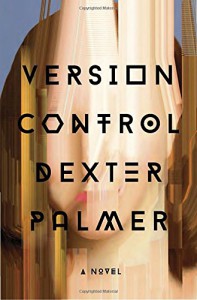Version Control, by Dexter Palmer

I'm seeing a theme in this year's Tournament of Books shortlist (or, I should say, those books whose samples appealed to me): genre-bending and concerns about identity. I like to think about the lines between or blurring genres, and I appreciate the lens of race or sexuality, both of which are commonly excluded from much genre fic.
Dexter Palmer's Version Control is speculative, but only just: its future is near, and there are certainly elements that are not at all far-fetched and therefore frightening: self-driving cars that can endanger passengers when, say, a firmware update has a glitch; data mining and what it could be used for; digital avatars, operating much like bot accounts on social media sites. There are also reminders for our own present, such as the real goals of online dating services--to keep you using (and paying) as long as possible, not successfully find a partner.
Palmer's novel is marketed as "time travel like you've never seen it before." I'll go ahead and preface my questions about and problems with the book by saying I'm easily confused by time travel narratives, no matter how well explained.
The book is structurally tight, with thematic echoes across points of view and timelines, of which there are two. The idea of "the best of all possible worlds" is central; when it's inevitably discovered that the device the protagonist's husband is working on is, well, working, despite a lack of scientific proof, the characters realize what we as readers learned about halfway through the book when details of their lives change (character x is dead instead of y; characters go--or don't go--by certain nicknames; character a cheats with character b rather than c, etc.): every time someone enters the "causation violation" chamber, a new timeline branches off.
Before the characters themselves are in the know, in the first timeline explored, the protagonist feels something's not right, but can't explain what. She's not alone; the phenomenon is experienced by others and has become a diagnosis. What I don't understand is why they have that sense of wrongness. I was also confused by Sean, the physicist and protagonist's son. Is his mural as his mother, Rebecca, sees it, or as Alicia sees (or doesn't see) it? Is he simply an artistic child suffering from loss?
Though thematically sound with some fresh explorations of gender and race in the hard sciences especially, Version Control didn't quite come together for me. I didn't particularly like or care about any of the characters; I'd say Carson was most interesting to me. The end was fairly predictable; I enjoyed the first half more. I have some stylistic quibbles that are just my bias, like chunks or pages of dialog, which reminded me of exposition in movies, and what felt like unnecessary section breaks. But I wanted to know what happened next, and the mystery of what was going on and why definitely kept me reading.










